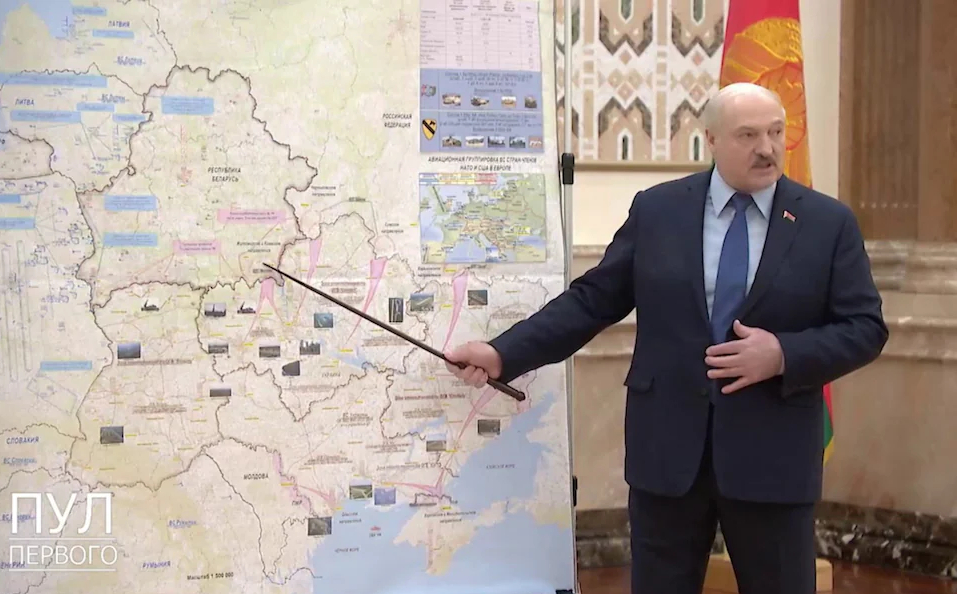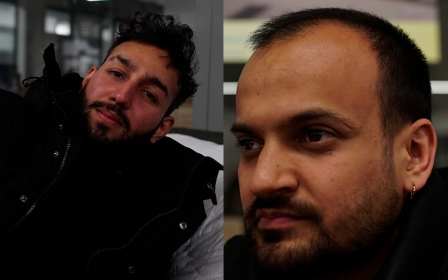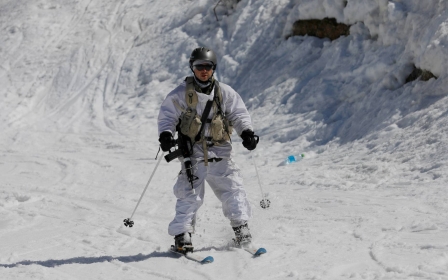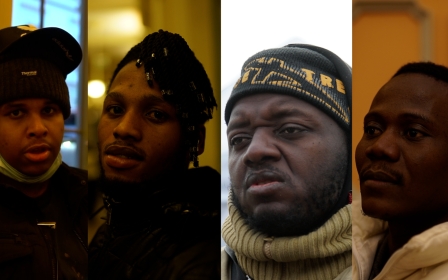Russia-Ukraine war: Moldovans brace for potential Russian invasion
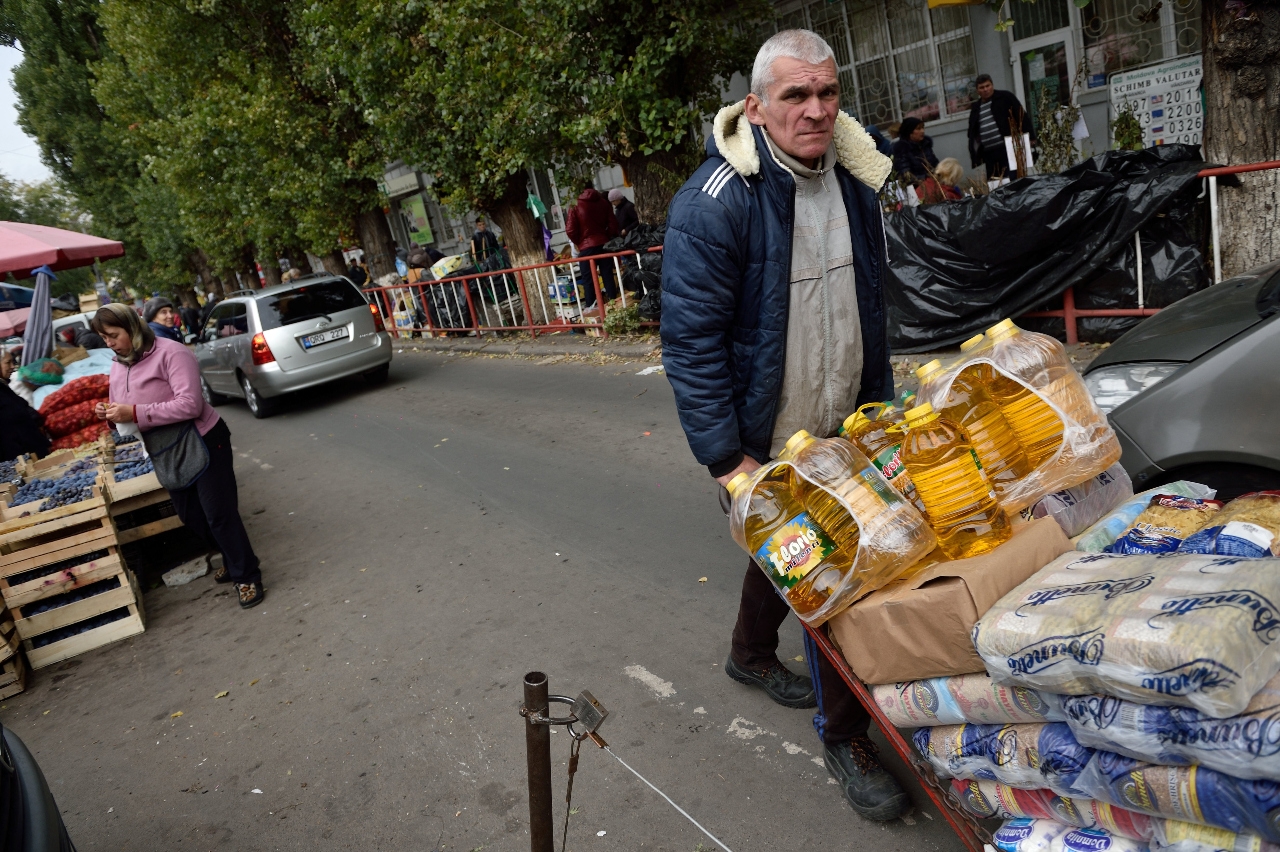
Alex Sirbu was sleeping in his home in a Chisinau suburb when Russia last month launched its full-scale military invasion of neighbouring Ukraine in the early hours of the morning.
The sounds of bombs falling reached all the way to the Moldovan capital and woke up the 30-year-old. He was unsure whether the noises came from his own country or not, so he picked up his phone and checked Telegram.
"That's how I found out what was going on," Sirbu told Middle East Eye.
For Maria Miron, a 24-year-old project manager also living in Chisinau, the news of the war made her "burst into tears".
"I felt a knife in my heart, I immediately thought of all my friends in Ukraine and what awaits us in Moldova," Miron told MEE.
New MEE newsletter: Jerusalem Dispatch
Sign up to get the latest insights and analysis on Israel-Palestine, alongside Turkey Unpacked and other MEE newsletters
Their anxiety over the war has not lessened since it began on 24 February. It has only grown.
With Ukrainian intelligence pointing towards an attack on the port of Odessa, just 40km from Moldova, in the coming days - and Russian troops stationed in the breakaway region of Transnistria, which asked to be recognised as independent on the evening of 4 March - the probability of a Russian invasion of Moldova has increased, making people more worried.
Key city
While Russia's advance in northern Ukraine has been slow, the country's open coastal region in the south is less capable of fending off Russian aggression.
With the city of Kherson taken, Ukrainian intelligence seems to be suggesting that Odessa, a city of one million people, is the next target.
Videos of a large Russian fleet, including about eight tank-landing ships, off the shore of Odessa, have been circulating on social media.
"Odessa is an important point in this war for Ukraine to resist this invasion," said Iulian Groza, executive director for the Institute for European Policies and Reforms.
Should Odessa fall, the Kremlin will be able to punch a corridor through to Transnistria, which is part of Moldova and has been illegally occupied by Russia since 1991.
Meanwhile, Belarusian President Alexander Lukashenko, a close ally of Russian President Vladimir Putin, was seen in a photo on 1 March pointing at a military campaign map. In it, troops entering Odessa seemed to be advancing into the Transnistrian region in eastern Moldova.
While Lukashenko has said he will not join the invasion of Ukraine, he has been assisting Russia's military intervention from the north.
The presence of the Russian army in Transnistria presents an additional element of insecurity, said Groza, even though the breakaway region's leaders have publicly assured the international community it has no plans to get involved.
"Not everyone can take their word for it," said Groza, adding that Moldovan authorities are monitoring the region, which is very important not only for Moldova's security but for the whole international community.
Neutral by constitution
The Republic of Moldova, which is located between Romania and Ukraine, has a very small army, counting an average of just 7,000 active personnel and about 70,000 in reserves.
Its population of 2.6 million people is led by the progressive and pro-European Union President Maia Sandu.
Sandu applied for EU membership on 3 March, in tandem with Ukraine and Georgia, which was invaded by Russia in 2008.
The president's move is expected to trigger some backlash in Moldova, not least from the country's pro-Russian people but also potentially from Russia itself.
Moldova is neutral under its constitution, so it decided not to join in with the EU and United States in the barrage of sanctions imposed on Russia, or in supplying Ukraine with military equipment.
"There's no reason to believe that the Republic of Moldova is at risk regarding the war in Ukraine and there's no scenario in which Moldova will get involved militarily," said President Sandu in a social media post, "we will not get involved in the conflict happening in the neighbouring country.
But the eastern European country, which has the lowest GDP per capita in the region, has been working in collaboration with its close allies, especially Romania.
"If we choose to defend ourselves or fight back, I think the economy of the country will go down, and then we could be annexed, like Crimea, after the Russians reach Transnistria," says Sirbu.
"But on the other side, we have Romania, a good friend, who could defend us.”
However, Roman Andriiv, a 30-year-old Moldovan, doesn't think Moldova's invasion will happen any time soon.
"Ukraine is taking too many resources away from the Russian Federation," he said.
"Even if they succeed in conquering Ukraine, the process of integrating the Ukrainian territory and population will take quite a long time anyway, so in the next 10 years or so I think we have nothing to worry about from this perspective."
Preparing for the worst
Moldovans have also been united in their common goal of receiving Ukrainian refugees, taking in more than 120,000 so far.
But while the desire to help is there, the country might not be able to handle what seems to be a growing humanitarian and economic crisis triggered by the war in Ukraine.
Moldova relies heavily on imports from Ukraine, Russia and Belarus, and its workforce has a large presence in Russia, from where Moldovans have been sending money back home.
Its ability to manage this crisis and a potential invasion depends on its foreign policy, according to Groza, the foreign policy expert.
On 4 March, high-level UN and EU representatives were present in Chisinau, showing that the international community is dedicated to supporting Moldova through the crisis.
"The Republic of Moldova must promote a well-thought-out foreign policy," said Groza. "We cannot provide military support or get involved in this conflict."
Sirbu said that the invasion of Ukraine pushed a lot of people he knows to prepare their biometric passports and devise an escape plan "in case the worst happens".
Reports of Moldovians queueing to get their papers and passports ready have been popping up throughout the week.
And Moldovans like Miron who also have Romanian citizenship have all said they will make use of it.
"I try not to think of a scenario where Russia will invade Moldova," said Miron. "But if that were to happen, I would go to Europe."
This article is available in French on Middle East Eye French edition.
Middle East Eye delivers independent and unrivalled coverage and analysis of the Middle East, North Africa and beyond. To learn more about republishing this content and the associated fees, please fill out this form. More about MEE can be found here.


